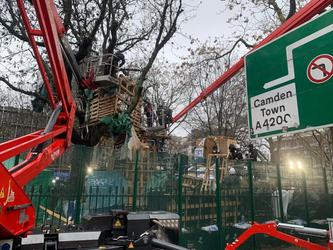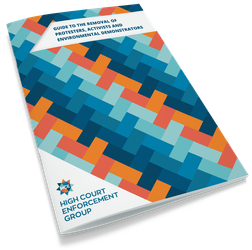Protesters and breaking the law

Let us start this article by saying that, although we remove protesters from key infrastructure sites on behalf of clients, we fully support the democratic right to peaceful, and therefore lawful, protest in the UK.
However, we often find that the protests we deal with can step over the line between what is lawful and what is not. It’s the reason why we put so much focus on risk assessment and planning, to prepare for the unexpected for those occasions when activists’ tempers run high.
Chris Packham – is it time to break the law?
We were interested to watch a recent Channel 4 programme by Chris Packham, the conservationist and environmentalist, where he debated the question of whether it is now time for environmental protesters to start breaking the law, in order to effect policy change.
In the show Packham interviewed several key figures in the environmental protest movement to see where they stood on the peaceful protest / breaking the law continuum.
He also talked extensively about his own feelings on the matter, describing himself as having been a “peaceful democratic activist” for years.
John Selwyn Gummer, Baron Deben
He interviewed Lord Deben, a Conservative peer, who had chaired the Government’s climate change committee and is certain that climate change is a serious issue. In Lord Deben’s view, some protests help the cause, while others do not, and that democracy is the only way to make change happen.
Peter Lilley, Baron Lilley
Lord Lilley, also a Conservative peer, sits on the House of Lords environment and climate change committee. He does not believe that the recent increases in the number of floods and fires is related to climate change and argues for a reduction in environmental action. Packham points out that mainstream scientists do not agree with Lord Lilley’s opinions.
Andreas Malm
Packham meets with Sweden’s Andrea Malm, who is one of the world’s most radical environmental protesters and the author of the book that calls for more radical violent action: “How to blow up a pipeline”.
Malm’s view is that social progress needs a radical wing and cites Mandela’s sabotage campaign against the Apartheid regime that led to his imprisonment. He disagrees with Just Stop Oil’s disruption tactics, such as slow marches and locking onto M25 gantries to stop traffic, because, in his view, you need to get the general public onto your side and disrupting their lives doesn’t achieve that.
Roger Hallam
Roger Hallam is the co-founder of activist groups Extinction Rebellion (XR) and, more recently, Just Stop Oil.
He has been imprisoned for his activities in the past, but stated on camera that he does not advocate violence, but states that people “transgressing laws” is effective. He says that major changes in history have come about as a result of a trigger event and advocates civil disobedience/non-violent disruption. He says that he’s not one for blowing up pipelines.
Interestingly, he says that Packham, with his profile, doing something that would land him in prison would make a big change and would “make things happen”.
Greta Thunberg
Could such a programme be complete without an interview with Ms Thunberg? In her opinion, breaking the law is not a big deal if it doesn’t endanger anyone, because the laws don’t protect us from ecological collapse.
The risks
One of the dilemma Packham discusses is the risk of prison and he goes to meet one of the two men imprisoned for closing the Queen Elizabeth Bridge in Dartford for 40 hours in October 2022. They received the longest sentences in the UK for this type of activity.
Packham’s view was that this imprisonment is a form of torture.
Will we see Chris Packham breaking the law?
At the end of the hour-long programme, with interviews interspersed with Packham’s spoken internal monologue about whether he should start breaking the law, he decides that he has to “raise his voice”.
He concludes that protesters do need to break the law, as long as no one is hurt, and they will have his support. He thinks it’s the “ethically responsible thing to do”, unsurprisingly falling some way short of committing himself to any such course of action.



